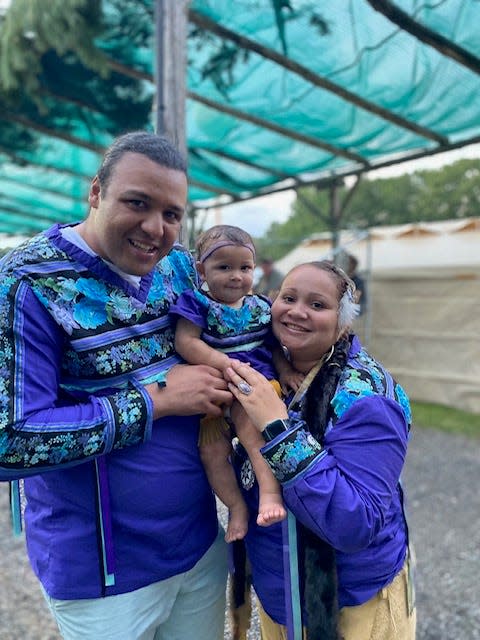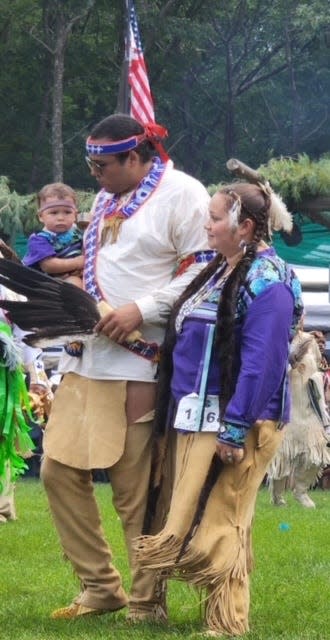Mashpee Wampanoag: No, it's not okay to dress as a Native American for Thanksgiving
From sports mascots to Halloween costumes to Native American-themed dress-up, "Native Americans face mockery of our culture every day," said Keturah Peters, a member of the Mashpee Wampanoag Tribe.
While it's overwhelming to address each insulting instance, Peters said she was furious enough to speak up when her son Epenow's preschool added a Thanksgiving-themed dress-up day and feast to its November school calendar. Families were invited to dress their children up as a Pilgrim, a Native American, or a turkey at Little Stars Learning Center on Thursday, Nov. 16.
The event was inappropriate, said Peters, because children could be exposed to false images of what a Native American person is.
"All the children will think it's OK to mock Epenow's culture," she said.

In an email dated Nov. 1, Peters wrote to Sydney Stump-Philibin, co-owner and chief operating officer of STAR Preschools, and Little Stars Learning Center, expressing her unhappiness.
"Dressing as a Native American only increases and encourages the use of stereotypes and is damaging to these kids," Peters wrote to Stump-Philibin.
In a Dec. 5 email to Peters, Stump-Philibin said the school's primary aim was to introduce different cultures to students and provide them with a well-rounded education.
"It was never our intention to trivialize or make light of any cultural group, and I apologize if the calendar gave you that impression," said Stump-Philibin in the email.
Both emails were provided to the Times by Brian Weeden, chairman of the Mashpee Wampanoag Tribe. Weeden is also Epenow's father.
The event remained on the calendar after Peters sent her email, said Weeden, which prompted the couple to request an in-person meeting with Stump-Philibin and her mother Tonya Stump, who co-owns the preschool.
"They didn't understand why we were so upset," said Weeden.
Preschool takes Native dress off the calendar
Weeden told the Times they discussed their concerns with Stump and Stump-Philibin on Nov. 7.
"The conversation actually went really well," said Weeden.
The mother-daughter team sent an email to parents asking them not to dress their children up as Native Americans for the Nov. 16 event. Families could still dress their children as Pilgrims or turkeys, the Nov. 7 email read. Weeden provided the email to the Times.
"I am not part of the Wampanoag tribe so I can’t speak to how they feel but we wanted to understand their concern, their thoughts and perspective," said Tonya Stump during a phone interview.
Tonya Stump told the Times that another Wampanoag family, whom she didn't name, complained that their child couldn't come to school dressed in traditional regalia.

Not all tribal families agree on issues surrounding mascots and Native-themed dress-up, said Weeden. For his family, though, the event was unacceptable — especially during Native American Heritage Month.
"It opened the door to allow non-Native people to dress up as Native American and that could give children a distorted view of who we are as tribal people," said Weeden.
Tonya Stump, who also owns preschools in East Dennis and Plymouth, said her ancestors were part Cherokee. They were never upset by non-Native people dressing up in tribal attire, she said.
"But it would have been insensitive of us to ignore their (Weeden and Peters) opinion," she said.
STAR Preschools will continue to teach about every holiday, and every tradition from Valentine's Day to Kwanzaa to Veterans Day, said Tonya Stump.
"There's a way to do it and not take fun out of it," she said.
"There are many ways to honor a culture," said Peters.
Dressing up as actual people — whether it's Mexican or African or Native American is not OK, she said.
"Epenow wears clothes just like everyone else to school. He wears his traditional clothes during important and sacred times," she said. "No culture should be mocked."
Another family says no to headdresses in East Sandwich
Shaylyn Gooden's daughter Kellani, 6, once attended Little Learners Preschool in East Sandwich. In November 2021, children in the program were instructed to make Pilgrim hats and "Indian-themed headdresses," Gooden said. The hat was made out of foam cutouts for feathers and the hat said "Chief Kellani," on the front, said Gooden.
"It seemed like they made her sit as if she was the chief and the other students were the Pilgrims," said Gooden.
Adopted into a Mashpee Wampanoag tribal family, Gooden said she felt the school was disrespecting tribal culture. She complained to school staff the following day in a phone call.
"I was livid as soon as I saw (the mock headdress) and told them how inappropriate it was. They felt like I was overreacting," said Gooden.
Taylor Hutchinson, director of Little Learners Preschool, said staff conducted the activity Gooden described with students at the school.
"It was a project we bought off Amazon," said Hutchinson.
Hutchinson claims no parent complained about the project but said the school hasn't done the activity since.
"We've been doing turkey hats. We switch it up every year," said Hutchinson.
The school tries to go out of its way to respect culture because it's important to the region, said Hutchinson.
"We study (Wampanoag) their symbols. We cut out canoes and make coiled pots, necklaces and watch videos where they teach Native American dance," said Hutchinson.
Gooden said Kellani, who was age 4 at the time, was the only child of color at the preschool and often told her mother that she felt uncomfortable there.
"They looked at me as a poor, Black mom," she said. "They dismissed us and dismissed any thoughts of us."
After feeling unsupported at the school, Gooden said the Thanksgiving headdress was the last straw. Kellani was removed from the preschool.
My culture is not your costume, said Brad Lopes.
Brad Lopes, a member of the Gay Head (Aquinnah) Wampanoag Tribe and a former teacher, grew up in Maine and attended Skowhegan Area High School and said his school's Indian-themed sports mascot often hurt him psychologically. The mascot for "the Indians," said Lopes, portrayed a Native American person holding a spear.
There were many instances, said Lopes, when teachers and students asked him to bring in a headdress and be the school's mascot. Inappropriately using stereotypical Indigenous imagery, he said, can have a deep psychological impact on tribal children.
"It's a deep colonized theft of identity and it's harmful and objectifying," he said.
After pressure from the Penobscot, Passamaquoddy, Maliseet and Micmac tribes, Skowhegan Area High School dropped its mascot in 2020, and became the River Hawks, said Lopes. Lopes graduated from Skowhegan Area High School in 2011 and eventually became a middle school and high school teacher at schools throughout Maine and Massachusetts. He developed "My Culture is not a Costume," a program that helps educators and school professionals address forms of cultural appropriation.
"Schools should be making the effort to learn about tribal culture directly from actual tribal people," he said.
Dressing up during Thanksgiving as a Native person has no educational value, Lopes said. Instead, schools could teach about Indigenous harvest foods and the connection that these foods have to Indigenous people. Lopes encourages teachers to think outside the box.
"As long as historical wrongs continue, these notions will remain hollow and performative," he said.
Tonya Stump said her students will focus on being thankful for the rest of this holiday season. The school is holding its annual turkey drive and families are donating food and giving financial contributions to a handful of community organizations. The school matches all donations, she said.
"We are committed to learning, growing and better understanding what is considered hurtful to local tribal members," Tonya Stump said.
For Peters, the school and the community needs to be more aware and respectful of Wampanoag culture.
"You sit and live on the Native lands of the Wampanoag tribe," she said. "We are a sovereign nation. Many of these issues stem from a lack of knowledge. If you want to program around other cultures, please do research or ask for help."
Rachael Devaney writes about community and culture. Reach her at rdevaney@capecodonline.com. Follow her on Twitter: @RachaelDevaney.
Thanks to our subscribers, who help make this coverage possible. If you are not a subscriber, please consider supporting quality local journalism with a Cape Cod Times subscription. Here are our subscription plans.
This article originally appeared on Cape Cod Times: Why the Wampanoag Tribe opposed Cape preschool's Thanksgiving idea
